Even Alzheimer’s Disease is linked to poor sleep.
Did you know that “sleeping well” is not only good for energy, immunity and mood but also prevents Alzheimer’s?
Professor Maiken Nedergaard, a Danish neuroscientist, published an article in Scientific American in 2016, pointing out that sleep time is the most active and efficient time for “brain detoxification”. If the detoxification process is hindered, toxic waste products such as amyloid produced during the brain’s working process can accumulate in or around nerve cells, which can lead to neurodegenerative diseases such as Alzheimer’s disease.
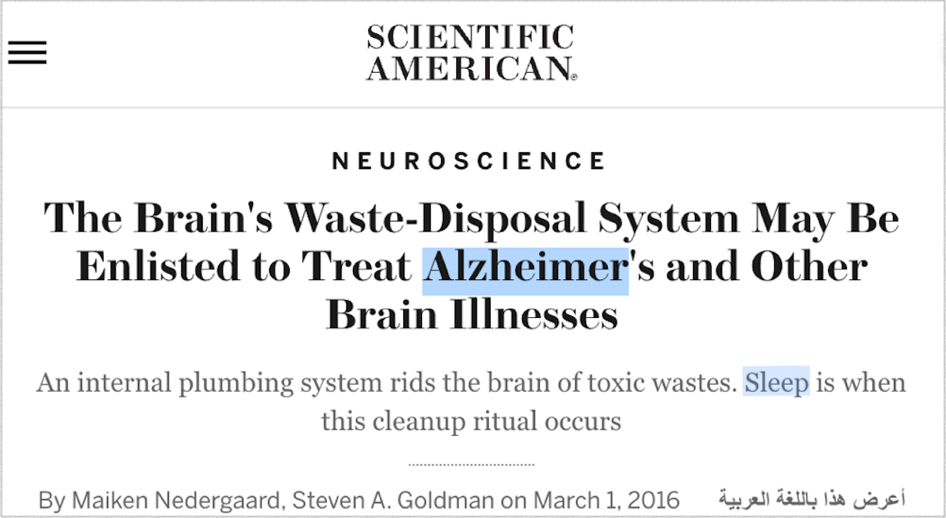
The phenomenon of mutual influence between sleep and immunity, which was discovered as early as the last century, has been more thoroughly understood in this century.
The leading German neuroscientist Dr. Jan Born and his team have proved through research that the immune system has two different performances during night sleep (من 11:00 p.m. ل 7:00 a.m. the next day) and during wakefulness: The deeper the Slow Wave Sleep (SWS), the more active the immune response to anti-tumor and anti-infection (increased concentrations of IL-6, TNF-α, IL-12, and increased activities of T cells, dendritic cells and macrophages) while the immune response during wakefulness was relatively suppressed.

The quality of your sleep is not under your control.
The importance of sleep is unquestionable, but the problem is that sleeping, which seems to be the simplest, is even more difficult for many people. This is because sleep, like heartbeat and blood pressure, ينظمه الجهاز العصبي اللاإرادي ولا يمكن التحكم فيه بالإرادة الفردية (الوعي).
يتكون الجهاز العصبي اللاإرادي من الجهاز العصبي الودي والجهاز العصبي السمبتاوي. الأول مسؤول عن «الإثارة». (توتر)", مما يحشد موارد الجسم لمواجهة الضغوط في البيئة; هذا الأخير مسؤول عن "قمع الإثارة". (الاسترخاء)", حيث يمكن للجسم أن يستريح, إصلاح وإعادة الشحن. العلاقة بينهما مثل الأرجوحة, جانب واحد مرتفع (strong) والجانب الآخر منخفض (ضعيف).
في ظل الظروف العادية, يمكن للأعصاب الودية والباراسمبثاوية التبديل بحرية. لكن, عند بعض الأسباب (مثل المرض, المخدرات, العمل والراحة, بيئة, التوتر والعوامل النفسية) تدمير آلية التعديل بين الاثنين, وهذا يعني, فهو يسبب خللاً في التوازن تكون فيه الأعصاب الودية قوية دائمًا (من السهل أن متوترة) والأعصاب السمبتاوية تكون ضعيفة دائمًا (من الصعب الاسترخاء). هذا اضطراب في التنظيم بين الأعصاب (ضعف القدرة على التبديل) هو ما يسمى ب"الوهن العصبي".
تأثير الوهن العصبي على الجسم شامل, وأبرز الأعراض هو "الأرق". صعوبة في النوم, عمق النوم غير الكافي, أحلام متكررة وسهولة الاستيقاظ (نوم سيء), وقت نوم غير كافي, وسهولة انقطاع النوم (صعوبة العودة إلى النوم بعد الاستيقاظ). وهو مظهر من مظاهر الأرق, والأرق هو مجرد غيض من فيض عندما يؤدي الوهن العصبي إلى خلل في الأعضاء المختلفة.
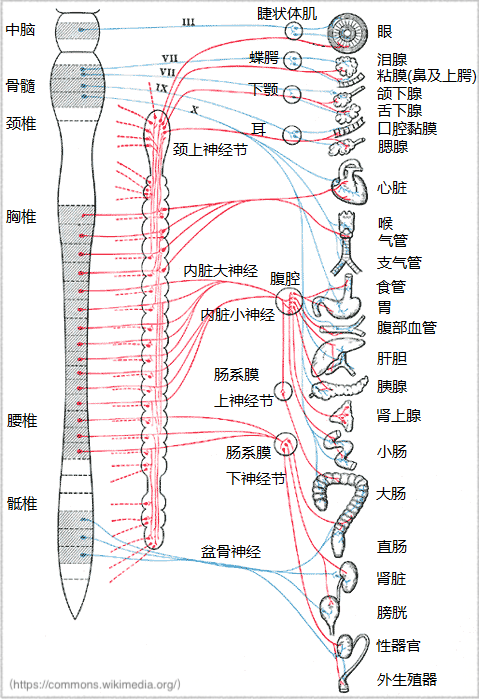
الجهاز العصبي الودي (أحمر) &
الجهاز العصبي السمبتاوي (أزرق)
(مصدر الصورة: ويكيميديا كومنز)
في السبعينيات, ثبت ذلكغانوديرما لوكيدوم has a sleep-promoting effect on the human body.
غانوديرما لوكيدوم can improve symptoms related to insomnia and neurasthenia, which was initially proved through clinical application as early as 50 منذ سنوات (details in the table below).
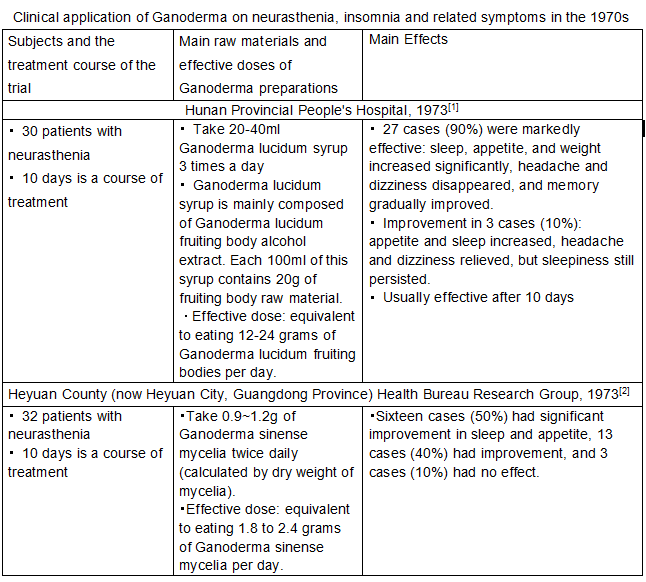
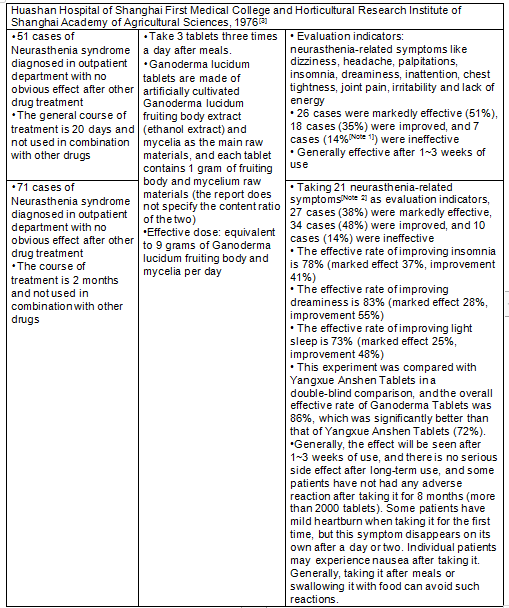
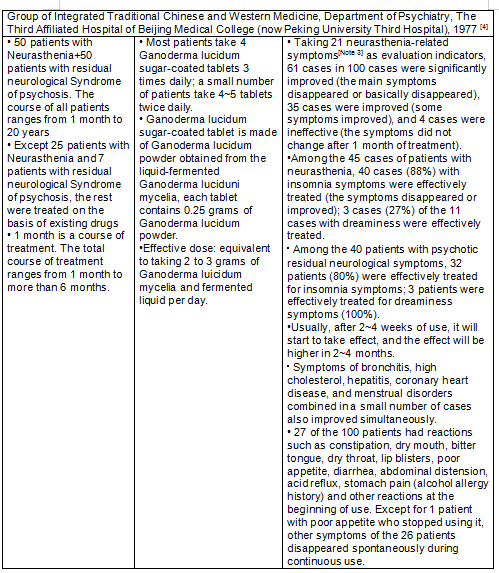
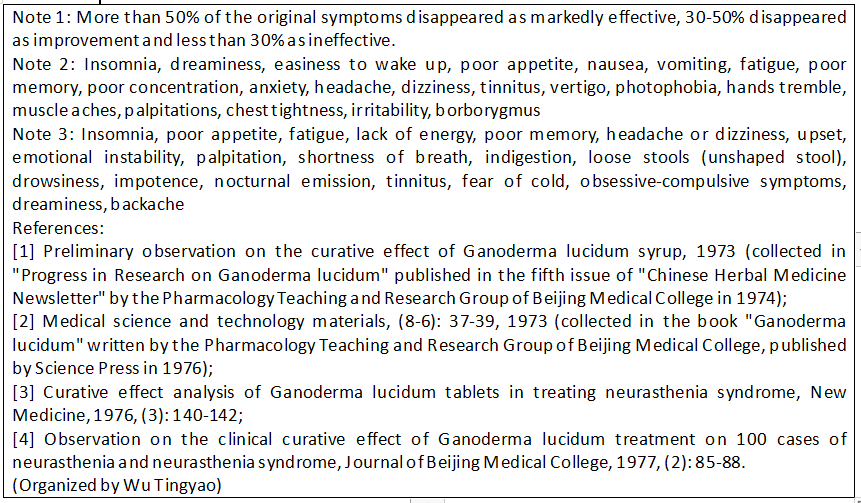
Learn from the clinical experience ofغانوديرما لوكيدوم to help sleep
In the early days, due to the limited resources of animal experiments, there were more opportunities to verify the efficacy of غانوديرما لوكيدوم through human experiments. بشكل عام, whether غانوديرما لوكيدوم is used alone or in combination with western medicine, its effectiveness in correcting sleep disorders caused by neurasthenia and solving sleep-related problems such as appetite, mental power and physical strength is quite high. Even patients with stubborn neurasthenia have great opportunities.
لكن, تأثيرغانوديرما لوكيدوم is not fast, and it usually takes 1-2 أسابيع, or even 1 شهر, to see the effect, but as the course of treatment increases, سوف يصبح تأثير التحسن أكثر وضوحا. المشاكل الموجودة لدى بعض الأشخاص مثل مؤشرات التهاب الكبد غير الطبيعية, ارتفاع نسبة الكولسترول, التهاب الشعب الهوائية, الذبحة الصدرية, ويمكن أيضًا تحسين اضطرابات الدورة الشهرية أو إعادتها إلى وضعها الطبيعي أثناء فترة العلاج.
الجانوديرما الاستعدادات المصنوعة من مختلف غانوديرما لوكيدوم يبدو أن المواد الخام وطرق المعالجة لها تأثيراتها الخاصة, والجرعة الفعالة ليس لها نطاق معين. أساسًا, الجرعة المطلوبة ل الجانوديرما الاستعدادات وحدها يجب أن تكون أعلى من المتوقع, والتي يمكن أن تلعب أيضًا دورًا تكميليًا عند استخدامها مع الحبوب المنومة المهدئة أو الأدوية لعلاج الوهن العصبي.
قد يعاني عدد قليل من الأشخاص من أعراض مثل جفاف الفم والحلق, تقرحات الشفاه, الانزعاج الهضمي, الإمساك أو الإسهال في بداية تناوله غانوديرما لوكيدوم الاستعدادات, ولكن عادة ما تختفي هذه الأعراض من تلقاء نفسها أثناء استخدام المريض المستمر لها غانوديرما لوكيدوم (بأسرع ما يمكن يوم أو يومين, بطيئة مثل أسبوع أو أسبوعين). يمكن للأشخاص الذين يعانون من الغثيان أيضًا تجنب الانزعاج عن طريق تغيير مدة تناوله غانوديرما لوكيدوم (سواء أثناء أو بعد الوجبات). من المتوقع أن ردود الفعل هذه هي على الأرجح عملية تكيف الدساتير الفردية معها غانوديرما لوكيدوم, وبمجرد أن يتكيف الجسم, ومن الطبيعي أن يتم القضاء على ردود الفعل هذه.
من حقيقة أن بعض المواضيع استمرت في اتخاذها غانوديرما لوكيدوم الاستعدادات ل 6 أو 8 أشهر دون أي آثار سلبية, يمكن أن نستنتج ذلك غانوديرما لوكيدوم يتمتع بمستوى عالٍ من سلامة الغذاء والاستهلاك على المدى الطويل ليس ضارًا. وقد لاحظت بعض الدراسات أيضًا في الأشخاص الذين تناولوا غانوديرما لوكيدوم ل 2 أشهر تلك الأعراض التي تحسنت بالفعل أو اختفت تدريجياً داخلها 1 بعد شهر من التوقف عن استعماله غانوديرما لوكيدوم.
وهذا يدل على أنه ليس من السهل جعل الجهاز العصبي اللاإرادي المضطرب يعمل بشكل طبيعي وثابت لفترة طويلة بعد تصحيح الاضطراب. لذلك, قد تكون الصيانة المستمرة ضرورية في ظل فرضية السلامة والفعالية.
التجربة تخبرنا أن أخذ غانوديرما لوكيدوم لتحسين النوم يتطلب المزيد من الصبر, المزيد من الثقة, وأحيانا جرعة أكثر قليلا. والتجارب على الحيوانات تظهر ذلك غانوديرما لوكيدوم الاستعدادات قد تكون فعالة ولماذا. فيما يتعلق بهذا الأخير, وسنشرح ذلك بالتفصيل في المقال التالي.

مراجع
1. يمكن استخدام نظام التخلص من النفايات في الدماغ لعلاج مرض الزهايمر وأمراض الدماغ الأخرى. في: العلمية الأمريكية, 2016. تم الاسترجاع من: https://www.scientificamerican.com/article/the-brain-s-waste-disposal -system-may-be-enlisted-to-treat-alzheimer-s-and-other-brain-illnesses/
2. الخلية التائية والمستضد يعرضان نشاط الخلية أثناء النوم. في: BrainImmune, 2011. تم الاسترجاع من: https://Brainimmune.com/t-cell-antigen-presenting-cell-sleep/
3. ويكيبيديا. الجهاز العصبي اللاإرادي. في: ويكيبيديا, 2021. تم الاسترجاع من https://en.wikipedia.org/zh-tw/ الجهاز العصبي اللاإرادي
4. المراجع ذات الصلةغانوديرما لوكيدوم تم تفصيلها في ملاحظات الجدول لهذه المقالة
END
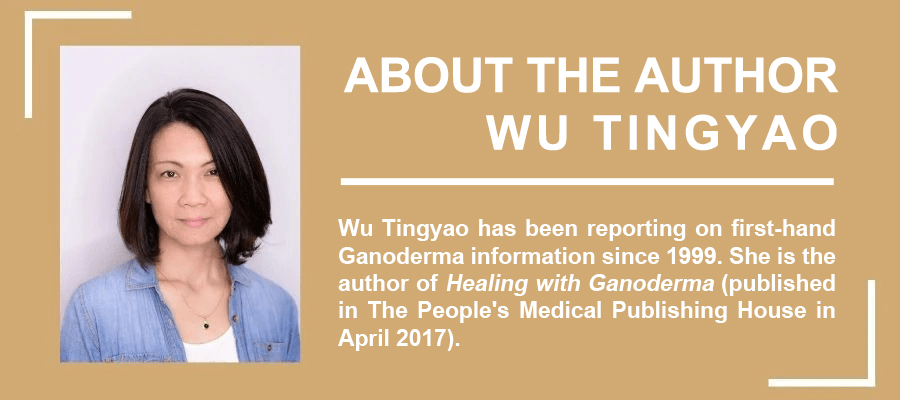
★ يتم نشر هذه المقالة بموجب التفويض الحصري للمؤلف, وملكيتها تعود إلى GanoHerb.
★ لا يمكن إعادة إنتاج العمل المذكور أعلاه, مقتطف أو مستخدم بطرق أخرى دون تصريح من GanoHerb.
★ إذا كان العمل مصرحا للاستخدام, ويجب استخدامه ضمن نطاق التصريح مع الإشارة إلى المصدر: جانوهيرب.
★ عن أي انتهاك للبيان أعلاه, سوف يتابع GanoHerb المسؤوليات القانونية ذات الصلة.
★ تمت كتابة النص الأصلي لهذه المقالة باللغة الصينية بواسطة Wu Tingyao وترجمها إلى الإنجليزية بواسطة Alfred Liu. إذا كان هناك أي اختلاف بين الترجمة (إنجليزي) والأصل (الصينية), يجب أن تسود الصينية الأصلية. إذا كان لدى القراء أي أسئلة, يرجى الاتصال بالمؤلف الأصلي, آنسة. وو تينغياو.



